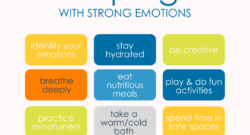Uncategorized
Exciting Times Ahead: Embracing Change with Our Brand Refresh
Change is in the air here at Upopolis! We’re thrilled to unveil our refreshed brand identity, marking a new chapter in our 17 year journey.
A brand refresh isn’t just about updating visuals; it’s a bold statement of where we’ve been, and where we’re going. Ultimately, it’s our commitment to staying relevant with the teens and young adults who use our website, and the professionals who refer them to us. Our new logo is a representation of our dedication to connection. The three dots symbolize individuals coming together through our Islands and the larger Upopolis community.
Why the change? As we grow and adapt to new challenges and opportunities, we recognize the importance of aligning our brand with our vision for the future. This brand refresh is a reminder that Upopolis is a trusted and empowering online community for youth facing stressful life events, including grief and medical challenges. Upopolis is a safe space for connection, support and empowerment, with the goal of reducing social isolation and fostering resilience.
What can you expect? Beyond a fresh look, we are shifting our target audience to youth aged 13 to 23 across North America. We will continue to raise awareness about our free-of-charge programming to patients, parents, siblings and health professionals in this catchment area. Look out for our updated website which will be more user-friendly, resource-heavy, and an easy place to guide patients, parents and health professionals to find out more about Upopolis. Website updates will be announced in the coming months!
Thank you for being part of our story. We invite you to explore our new look, connect with us, and join us on this exciting journey forward. Together, let’s embrace change and write the next chapter of success for Uopolis!
Here’s to new beginnings and endless possibilities!



Youth Takeover: What I wish other people knew about living with a chronic illness
Jenna is a long-time member of Upopolis and a regular contributor to our blog post series. We appreciate and value everything she teaches us about being a young adult living with a chronic illness.
Today, she shares 5 things she wish others knew about living with a chronic illness. This is so insightful to those of us who don’t have a medical illness, as well as incredibly validating for those who do. Check out what she has to say:
1. The invisibility of an illness does not diminish its existence or impact. Invisible illnesses, often overlooked due to their lack of visible symptoms, can be just as debilitating as those with outward signs. Individuals including myself facing these conditions may struggle with daily challenges that go unnoticed, emphasizing the importance of empathy and understanding. Acknowledging the presence of invisible illnesses promotes a more compassionate and supportive approach to those dealing with such health issues.
2. The visibility or recognition of an illness does not determine its validity, and this holds true for individuals often referred to as “spoonies” who contend with chronic and invisible health conditions. Whether an illness is widely understood or remains unknown, the experiences and challenges faced by those dealing with chronic health issues are valid and significant. The term “spoonie” is often used to describe people managing conditions like fibromyalgia, lupus, or chronic fatigue syndrome, emphasizing the daily allocation of limited energy “spoons.” Recognizing and respecting the validity of these experiences promotes empathy and a more inclusive understanding of diverse health struggles.
3. When chronic illness warriors find themselves needing to cancel plans, it’s not an expression of dislike or a desire for isolation. Rather, it reflects the unpredictable nature of their health challenges. It’s crucial for friends and loved ones to continue extending invitations, engaging through FaceTime, and making efforts to foster a sense of inclusion. Chronic illness warriors appreciate gestures that make them feel loved and understood, such as learning their unique love languages. In doing so, relationships can thrive despite the challenges posed by chronic health conditions, reinforcing the importance of compassion and ongoing support.
4. Experiencing occasional colds or minor illnesses may provide insight into temporary discomfort, but it doesn’t equate to a full understanding of the complex and enduring challenges that come with chronic illnesses. Chronic conditions often involve persistent symptoms, fluctuating health, and long-term impacts on daily life. It’s essential to recognize the distinction between short-term ailments and the ongoing struggles faced by those with chronic health issues. Empathy and genuine understanding can only be cultivated through acknowledging the unique and sometimes invisible aspects of chronic illness experiences.
5. Choosing not to drink alcohol, whether due to health reasons or personal preferences, doesn’t diminish one’s coolness or ability to enjoy social gatherings. The decision to abstain from alcohol is a valid choice that deserves respect and understanding. Many still find joy in partying and dancing without the need for alcoholic beverages, embracing alternatives like delicious mocktails. Creating an inclusive environment where individuals feel validated in their sobriety fosters a more considerate and accepting social atmosphere, acknowledging the diversity of preferences and lifestyles.
Thank you to Jenna, and all our Upopolis members, who teach us something new every day!
Journal Prompts for Youth Experiencing Stressful Life Events
Journaling is often suggested as a way to cope with challenging life events, such as illness or grief. It offers many benefits for our mental, emotional and even physical well-being.
- Emotional expression: Documenting our thoughts and feelings is a healthy way to express emotions and reduce stress.
- Self-reflection: Journaling allows us to gain insight into our own thoughts and behaviours. When we reflect on our own experiences, we can better understand our responses to situations.
- Problem solving: Writing about our challenges or problems can help us brainstorm solutions and consider different perspectives.
- Gratitude: Identifying things we are grateful for can promote a positive outlook and feelings of happiness.
- Improved self-esteem: Taking the time to recognize our own accomplishments, strengths and positive experiences can boost self-confidence and self-esteem, since a journal is a tangible reminder of our achievements.
Over the past few months, the Upopolis Instagram page (@upopolis) has been sharing journal prompts for youth who are experiencing challenging life events, including youth with a medical illness, and youth with a parent or caregiver with a medical illness.
Today, we are sharing these journal prompts all in one place for easy access and BONUS, we have added journal prompts for youth who are grieving, and youth who have a brother or sister with a medical illness.
Check out the full list below, and be sure to save this article!
Journal Prompts for Youth with a Medical Illness
- Some coping strategies I can use during painful days or flare ups…
- Something that my medical illness has prevented me from doing is… Some ways I can try to make this happen are…
- Here are some goals I have despite my illness…
- How has this illness helped me become resilient?
- A time I felt proud of myself was when…
- Things in my life I can control…
Journal Prompts for Youth with a Parent/Caregiver with a Medical Illness
- Some coping strategies I can use during sad/frustrating days…
- If I could tell me parent/caregiver anything, I would tell them…
- What can I do to give myself more “me” time?
- How has this experience helped me become resilient?
- 5 good things about today…
- Things in my life I can control…
Journal Prompts for Youth who are Grieving
- A list of people I can go to for support, either in person or virtually…
- A memory of my person who has died that makes me cry is…
- A memory of my person who has died that makes me laugh…
- If you could tell the person who died about your day, what would you tell them?
- In my body, I feel grief… (where?) How does it make me feel?
Journal Prompts for Youth who have a Brother/Sister with a Medical Illness
- Today, I’m having a hard time with…
- Something I wish my support system could understand or help with is… Ways I could tell them about this are…
- Am I respecting my boundaries? Everything I want to say yes to is… and everything I want to say no to is…
- Sometimes I can’t control my sibling’s illness. However, some things I can control in my life are…
- What does a good day look like? What does a bad day look like? How can I add more good-day elements into my bad days?
Be sure to follow @upopolis on Instagram to get more coping tips and strategies like these journal prompts!
IT’S BACK! Virtual Camp for Youth with Cystic Fibrosis
We have an amazing virtual opportunity taking place July 8th – 12th for youth with cystic fibrosis!
Camp Maple Leaf and Upopolis are teaming up to provide youth living with cystic fibrosis from all across Canada the opportunity to participate in our virtual camp, “Camp Fromaway”! Last year was Camp Fromaway’s inaugural year, and it was a huge success. We can’t wait to do it again!
What is virtual camp?
It’s the experience of camp, but online!
Camp Fromaway provides youth aged 11-17 from across Canada who are living with cystic fibrosis, and their siblings, the opportunity to meet each other while participating in fun daily camp activities. Campers who register by April 30 will receive all activity supplies they need to participate.
The best part? Campers will meet others just like them! This will provide them with a sense of belonging, teach coping skills, and help reduce feelings of isolation often associated with chronic or medical illnesses.
How to register?
Applications for Camp Fromaway are will be accepted until April 30th, 2024 at the link:
https://forms.gle/SiciN6pnPg3fivz36
To receive a digital poster to print or e-mail to your patients/clients/students/families, e-mail support@upopolis.com – just ask for a Camp Fromaway poster.
What is Camp Maple Leaf?
Camp Maple Leaf is a not-for-profit sleepover camp for children of Canadian Military families and children living with unique challenges. Their sleepover camp provides children and families who share similar life experiences with a special place to call their own.
Upopolis and Camp Maple Leaf are on a mission to support youth going through challenging life events by connecting them with others through the camp experience. For more information, visit www.campmapleleaf.ca or e-mail support@upopolis.com.
Camp takes place July 8th – 12th from 12:00pm – 2:00pm EST. Can’t wait to see you there!
Coping with strong grief emotions
When someone you know dies, it can affect you and the people you know in many different ways. These changes can be very hard, so it can be helpful to find healthy ways to cope with strong emotions.
Here are 10 ways you can cope with all the strong emotions that come with grief:
- Learn the names of your emotions so you can better understand what you are feeling and share your emotions with someone else.
- Practice deep breathing and mindfulness activities (this can include lots of activities such as yoga, exploring the senses, spending time in nature, journaling, or doing arts and crafts).
- Move your body in ways that feel good for you, such as walking, dancing, or exercising.
- Eat meals that are full of good nutrients, and stay hydrated by drinking lots of water.
- Take a warm or cold bath/shower – whichever feels best for you.
- Find time to relax and rest your body, including sleeping.
- Engage in something creative such as music, art or dance.
- Play and do activities that you enjoy, every day if you can!
- Spend time in places that help you feel safe, calm, and comfortable. This can be your home, with friends or loved ones, or some place special to you.
- Talk with people you can trust and who really care for you.
Children’s Grief Awareness Day is on November 16 and was designed to help bring awareness to the needs of children and youth who are grieving. Click here to learn more: https://www.childrensgriefawarenessday.org/cgad2/index.shtml
7 Tips for Health Professionals who work with adolescent patients, from me! A Upopolis teen
I’m Jenna – a former pediatric patient, current adult patient, chronic illness advocate, veteran Upal, current Upopolis member, and a 19-year-old disabled queen. I want to share some valuable insights for healthcare providers on how to better support and communicate with teenagers.
It’s crucial to bridge the gap between treating teens like children and acknowledging that they are not quite adults yet, all while avoiding stigmatization and promoting a comfortable environment for their care. Here are a few tips for every professional who works with teenage patients who have a chronic or critical illness:
1. Respect Their Maturity: Teenagers, regardless of their medical condition, appreciate being treated with respect. It’s essential for healthcare providers to acknowledge their maturity and individuality. Try not to speak down to them or dismiss their feelings and concerns. Teens may not be adults, but they are capable of understanding their health conditions and making informed decisions.
2. Avoid Stigmatization: Teens are pretty cool, and they don’t want to be judged or stigmatized based on their age or appearance. Avoid making assumptions about their behavior or lifestyle choices. Be open-minded and supportive, recognizing that everyone’s journey is unique. Stigmatization only creates barriers to effective healthcare.
3. Offer Distraction and Support: For teenagers, undergoing medical procedures or facing chronic illnesses, distraction items, or offering support from a professional like a child life specialist, can be incredibly helpful. These professionals are skilled at providing emotional support and creative distractions that make the medical experience less intimidating. Whenever possible, involving them can ease the stress and anxiety teenagers may feel during their healthcare journey.
4. Address Body Image Issues: Body shaming has no place in healthcare. Teenagers, just like adults, can experience body image insecurities. When providing care, be mindful of your language and actions. Promote positive body image and self-acceptance. Encourage open conversations about body-related concerns, but always do so with empathy and sensitivity.
5. Be Kind and Empathetic: Kindness goes a long way, especially when working with teenagers facing health challenges. Showing empathy and compassion can make a significant difference in how teenagers perceive their healthcare experiences. Listen actively, validate their feelings, and offer emotional support. A little kindness can alleviate anxiety and foster trust.
6. Encourage Independence: While it’s important to provide guidance and support, empowering teenagers to take charge of their health is equally vital. Encourage them to ask questions, express their concerns, and actively participate in their treatment plans. By promoting independence, healthcare providers can help teens develop essential life skills for managing their health in the future.
7. Foster Communication: Effective communication is the cornerstone of quality healthcare. Ensure that teenagers have the opportunity to voice their opinions, ask questions, and participate in shared decision-making. Create a safe and non-judgmental environment for open dialogue, which can lead to better treatment adherence and overall well-being.
As a former pediatric patient, current adult patient, and chronic illness advocate, I can attest to the importance of healthcare providers following these guidelines when working with teenagers. It’s crucial to strike a balance between recognizing their maturity and providing age-appropriate care, avoiding stigmatization, and fostering a respectful, supportive environment. Distraction items, kindness, and empowerment are essential components of ensuring a positive healthcare experience for teenagers, regardless of their health challenges. By implementing these tips, healthcare providers can make a profound impact on the lives of their young patients, promoting their overall well-being and encouraging them to take an active role in their healthcare journey.
Parents: How to support youth who have a sibling with a medical illness
When any child faces illness or hospitalization, the entire family is impacted, including the siblings. During this time, the focus for parents is typically on the sick child; unfortunately, this means that the challenges and needs of siblings often go unrecognized and as a result, siblings do not receive the attention or support they need. It’s very common for siblings of every age to face numerous challenges, feelings, and reactions in response to their brother or sister’s illness.
When a child becomes ill, youth siblings may be confronted with changes to their typical routines, are often separated from family members, may receive less attention from caregivers, have difficulty relating to their peers, and may have fears or misconceptions in relation to their sibling’s condition. These challenges can lead to siblings experiencing feelings of anger, jealousy, worry, anxiety, and guilt. In response, siblings may become more withdrawn and engage less with others, have increased outbursts, and face challenges at school.
School-aged siblings (6-13 years old) commonly worry about their sick sibling and losing them, they may become resentful because of the changes in their routines and life, and jealous of the attention their sibling is receiving. The sibling may feel embarrassed, confused, and guilty; they may also become withdrawn, clingy and uncooperative.
Here are 5 tips to help you support your school-aged child(ren):
- Involve them in the healthcare journey as much as possible, and only if they want to be.
- Give them control and choice whenever and wherever possible while continuing to discipline appropriately.
- Encourage questions and give explanations.
- Maintain routines when possible.
- Ensure you are spending quality alone time with them.
- Always acknowledge and support their feelings.
Adolescent siblings (13-18 years old) are typically aware and concerned about the additional stress on their family and are impacted by the separation from family members and peers. Youth in this age range may fear the loss or change to their identity as they begin taking on more responsibility and their role within their family changes. They may also become insecure as they’re feeling different from their peers. Adolescents’ reactions may vary between wanting to be protective and caring, to being uncooperative, withdrawn, anxious, depressed, angry, frustrated and even resentful.
Here are 5 tips to help you support your adolescent child(ren):
- Listen to their concerns and answer any questions they have, honestly.
- Provide ongoing information and preparation about their sibling’s healthcare journey.
- Involve them in the healthcare journey as much as possible, and only if they want to be.
- Encourage peer interactions and relationships.
- Respect and encourage appropriate self-expression and independence.
Remember that it is normal for siblings to react, withdraw or act out, and even regress in response to their brother or sister’s illness. While there are many components of the illness and resulting impacts that are out of your control, there are ways you can help support your children through the challenges and journey your family is facing.
Finding strength in a community and support from others navigating similar experiences can also be extremely helpful for youth who have a brother or sister with an illness. Read about our new Sibling Island and how your child might benefit, here.
Navigating grief when heading back-to-school
September’s around the corner and that means it’s back-to-school. Navigating this traditional yet unfamiliar life event can come with additional uncertainties and emotional responses for youth grieving the death of someone in their life.
If you are a grieving youth, remember that it’s normal to experience a range of emotions such as sadness, anger, confusion, and even happiness. It’s normal to worry about how you will concentrate in class or what you will say to your classmates when you see them again. These emotions and thoughts might feel really big right now as you are in a period of change and transition, but know that these are normal.
If you’re a parent or guardian who is supporting a grieving child or youth who is heading back to school, it’s also important for you to understand the wide range of emotions that the griever will feel. You should also recognize that children and youth may be yearning for a return to normalcy, which is completely normal; they may still grieve while demonstrating excitement, happiness or joy about returning to school, their classmates, and their regular activities. Acknowledge everything your child may be feeling and know, it’s all OK.
As we prepare to go back-to-school, there are some tips and tricks to help make the transition a little easier and more manageable. Encourage grieving children and youth to:
- Identify a safe person who they can express their thoughts and feelings to about going back-to-school. This might be a parent, coach, neighbour, or someone else.
- Establish a routine that provides them with a sense of stability and predictability. Consistent routines, before and after school, can help children and youth feel more secure during times of change.
- Communicate with trusting teachers, school counselors, and administrators about your child’s situation, only if they feel comfortable to do so. They can offer support and make accommodations if necessary.
- Identify a “safe word” with a teacher or peer. Using this word can be helpful for when your child needs a break in school if their grief feelings feel too big and hard to manage.
- Bring a comfort or connection item to school that your child can keep in their backpack, desk, or pocket. Having a special item can help them feel connected to their person and remind them of special memories they shared together.
Remember, transitions can be hard and they can come with a variety of thoughts, feelings, and emotional responses. This is normal! As youth head back-to-school, look for the helpers, connect with trustworthy people, feel all the feelings, and take it one day at a time.
Upopolis Sibling Island: A Space Where the Focus is the Siblings: Part 1
When a child or youth is hospitalized or diagnosed with illness, each and every member of the family is affected. An illness in the family can have adverse developmental, psychosocial, behavioural and emotional outcomes for siblings, yet support is rarely provided to this population and challenges are not typically addressed. The focus of pediatric health care settings is on the child with the illness, and unfortunately siblings’ needs and the impact the illness has on them goes unnoticed and unaddressed. Due to COVID-19 restrictions over the past few years, siblings and family members have been further removed as they have not been able to be present in hospitals, and so the impacts on them may be far greater.
Upopolis Sibling Island is a private online group specifically created for youth aged 10 – 18 who have a brother or sister with a chronic or critical illness, medical condition, or disability. The Island is monitored led by a Certified Child Life Specialist who monitors it daily, and provides ongoing psychosocial support, education, and engagement opportunities to the healthy siblings. Siblings of youth often experience feelings of loneliness and guilt, are at increased risk for mental health issues and may have trouble relating to or talking with peers at school who do not understand what they are experiencing. The Sibling Island provides a space for youth to openly express themselves, as well as meet and connect with a community of other siblings who are facing similar life situations.
Why siblings should join the Island?
To receive information and ask questions about their sibling’s diagnosis/condition.
To access tips, resources and activities to help cope with the feelings and experiences associated with being a sibling of someone with an illness.
To have the opportunity to socially connect with other youth and create a peer support network.
To join monthly programming and group sessions – including fun games nights!
Overall benefits of Sibling Island:
The Sibling Island provides an opportunity for youth to talk about their experiences, which helps them process what they’re thinking and feeling and in turn, helps them develop strategies to manage the challenges and difficulties they are facing.
Being part of a community helps minimize the sense of isolation that siblings often face when their brother or sister is ill, and helps normalize and validate all feelings youth are having about their sibling’s illness.
Youth can access completely trusted and vetted resources that are specific to their experience; child life specialists are present online to answer questions, concerns or worries.
What you can do?
If you are a professional who knows someone who you think would benefit from joining the Sibling Island, visit this link.
If you are a youth who would like to join the Island and connect with other siblings (or a parent of the youth), please email: support@upopolis.com








